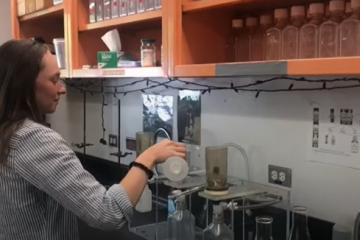Our Facilities
While the research lakes and their watersheds are the true laboratories of the IISD Experimental Lakes Area, the field station provides on-site living and working facilities and support for researchers.
Take a virtual tour of our facilties
Consisting of laboratories, a workshop, a kitchen and dining hall, dormitories, and living quarters, IISD-ELA is a self-contained community for up to 60 research personnel. Use our virtual map to see where our facilities are located, or scroll down the page to learn more details about each facility.
Eating
Meals are provided in Hungry Hall by the food services team from Monday to Friday throughout the open water season. The kitchen facility is a 3,000-square-foot dining room and lounge area that seats up to 60 diners. Visitors who stay through the weekend or in winter must prepare their own meals with available food and leftovers provided in Hungry Hall. Dietary requirements and food allergies must be provided to the Operations Manager in advance of arriving at the IISD-ELA facility. Food preferences are not considered to be dietary requirements. The food services team undertakes great effort in the planning and preparation of wholesome, healthy, and diverse food styles that will appeal to the various interests of staff, students, and researchers at the IISD-ELA facility.
MEAL TIMES
Breakfast 7:00–8:00
Lunch 12:00–1:00
Dinner 5:30–6:30
Chemistry Laboratory
The chemistry laboratory offers 6,800 square feet of lab space with a centrally distributed purified water system piped to dedicated faucets in each lab.
Lab space is assigned to visiting researchers according to research needs and availability. Visiting researchers are encouraged to use the services of the onsite lab.
Learn more about what goes down in our chemistry lab here.
Fish Laboratory
The IISD-ELA fish lab is the newest building on site. Built in 2010 and opened in 2011, the fish research team had significant input into the design and features of the lab; the result of this collaboration is a large building perfectly suited to fisheries research.
The lab houses the core IISD-ELA fish research team (two biologists, plus research assistants) and has desk space to accommodate up to six additional researchers/graduate students. A very large steel table takes up the middle of the lab and is ideal for dissections and other bench work.
The facility includes two built-in sinks and a snorkel fume hood system. A large mud room area with a floor drain keeps the mess from field equipment and clothing in one location. Outside, the lab features a covered, wrap-around deck with a steel table and sink with running water, a long garden hose, and hooks for hanging wet gear/nets.
A certain amount of storage space is available for use by external researchers on large shelves in the lab storage room, which also features a garage-style door for the transfer of large items.
Although some of the equipment in the fish lab is for IISD-ELA use only, some of the basic items used in fisheries research may be available for use by external researchers. These items include measuring boards, scales (up to 12 kg), tubs/buckets, rain suits, personal floatation devices/life jackets, and tools. Visiting researchers should inquire about equipment availability prior to arriving at IISD-ELA.
Transportation
All active research lakes are equipped with motorboats and boat landings. Users must possess a Pleasure Craft Operators Card to drive motorboats.
ATVs are available for use to access remote research lakes. Users must possess a valid ATV training certificate to use the camp ATVs. An ATV training course is available at the IISD-ELA facility. Please contact the Operations Manager for available times and pricing.
Shuttle vans for the transport of supplies and staff are available on a weekly basis from Winnipeg and Kenora to IISD-ELA. Please contact Roger Mollot, Operations Manager, at rmollot@iisd-ela.org or 204-229-4755 for the current schedule.
Seminar Series
Hungry Hall currently serves as the conference and seminar room at IISD-ELA. Throughout the open water season, a weekly seminar series is organized with presentations from IISD-ELA scientists, graduate students, and visiting researchers. All visitors to the facility are encouraged to prepare a seminar for presentation to the research community on site.
Power Generation
The IISD-ELA research facility is located in a remote and pristine area of northwestern Ontario, at the end of a private-access 30-km gravel road. There is no connection to the main power grid of Ontario. All energy needs of the camp are provided by a set of diesel generators and propane storage. It is part of the strategic plan for future facility upgrades to include the use of renewable energy technologies that will allow a shift in power generation away from reliance on diesel and propane.
Machine Shop
A 3,500-square-foot workshop is available for year-round maintenance of trucks, outboard motors, ATVs, snowmobiles, and road maintenance equipment. The workshop is heated using waste heat from the diesel generators that power the facility. In addition to vehicle maintenance, the shop has welding and carpentry tools for the maintenance and design of field equipment.
Laundry
Laundry facilities are included in the per diem cost for all researchers visiting the facility. The laundry room includes four washers and three dryers. All visitors are encouraged to save propane by making use of the multiple clothes lines in various locations throughout camp.






